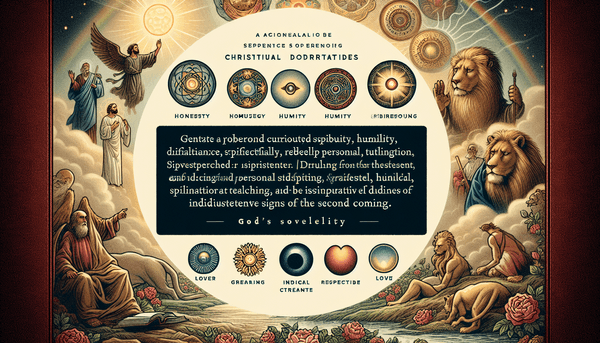The Beasts of Revelation
The Book of Revelation contains a myriad of symbols, none perhaps as compelling as the beasts that emerge from sea and land (Revelation 13:1, 11). These formidable figures represent the pervasive evil and the spiritual warfare that rages between the forces of good and evil, reminiscent of the journey of faith that Christians undertake in their path to salvation and eternal life. They also illustrate the deceptive nature of worldly powers that stand in opposition to God. In this spiritual battle, believers are called to faithfulness and perseverance, even amidst persecution (Ephesians 6:12). The beasts remind Christians that, though the struggle is real, 'He who is in you is greater than he who is in the world' (1 John 4:4), pointing towards the ultimate victory of God’s sovereignty over all opposing forces.
God's Ultimate Authority and Sovereignty
One of the central messages of the Book of Revelation is the affirmation of God's ultimate authority and sovereignty. The apocalyptic narrative reaches its crescendo with the victorious return of Jesus Christ, depicted as the conquering King of kings and Lord of lords (Revelation 19:16). The vision of a new heaven and a new earth (Revelation 21:1) further exemplifies the extent of God's reign, as does the Psalmist's declaration that 'God reigns over the nations' (Psalm 47:8). This divine rule is incontrovertible, as God, the blessed and only Ruler, will bring about the consummation of His kingdom (1 Timothy 6:15), demonstrating that His dominion is an everlasting dominion (Daniel 4:35).
FAQ
Q: What does it mean to 'seek first the Kingdom'?
A: To seek first the Kingdom is to prioritize God's will and righteousness in one's life, living in alignment with His purposes and commands, as instructed in Matthew 6:33.
Q: What are the signs that will precede the Second Coming of Christ?
A: The Bible describes various signs including wars and rumors of wars, natural disasters, the rise of false prophets, an increase in wickedness, and the spread of the gospel to all nations, as indicators of Christ's approaching return.
Q: What is the symbolic representation of the beasts in the Book of Revelation?
A: The beasts symbolize earthly powers and spiritual forces that oppose God and His people, illustrating the ongoing spiritual battle between good and evil, and the ultimate victory of God over all opposing forces.
Q: How does the Book of Revelation depict God's ultimate authority?
A: The Book of Revelation describes God's ultimate authority through passages such as the victorious return of Jesus Christ as the conquering King and the final defeat of Satan and his forces, affirming God's power and control over all creation.



